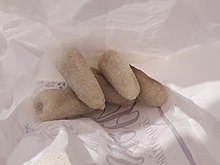
Amygdalota (Greek: Αμυγδαλωτά; almond pears) are a type of almond cookie associated with the Cyclades. Although these cookies don't contain any coconut, they are sometimes called "Greek macaroons".[1] They may be called rozethes, ergolavoi or troufes in some regions, and can be shaped like pears, or balls or other shapes. Whatever the shape, these cookies are usually made to be small enough to eat in one bite. They can be sweetened with honey and flavored with orange flower water or rose water.[2] There are similar almond cookies found throughout the cuisines of the eastern Mediterranean region.[3]
References
[edit]- ^ Karayanis, Dean; Karayanis, Catherine (2008). Regional Greek Cooking. Hippocrene Books. ISBN 978-0-7818-1146-0.
- ^ Chantiles, Vilma (1975). Food of Greece: Cooking, Folkways, and Travel in the Mainland and Islands of Greece. Simon and Schuster. p. 303. ISBN 978-0-671-75096-1.
- ^ Kremezi, Aglaia (2014). Mediterranean Vegetarian Feasts. Abrams. ISBN 978-1-61312-711-7.
Well, that’s interesting to know that Psilotum nudum are known as whisk ferns. Psilotum nudum is the commoner species of the two. While the P. flaccidum is a rare species and is found in the tropical islands. Both the species are usually epiphytic in habit and grow upon tree ferns. These species may also be terrestrial and grow in humus or in the crevices of the rocks.
View the detailed Guide of Psilotum nudum: Detailed Study Of Psilotum Nudum (Whisk Fern), Classification, Anatomy, Reproduction